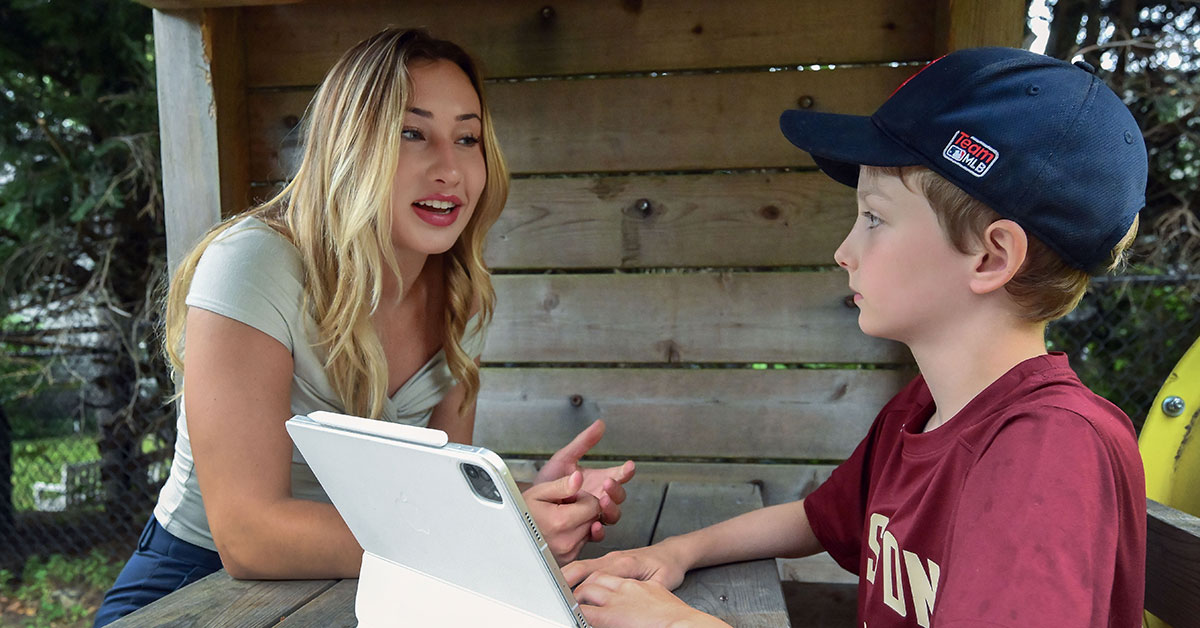Playing the research game

Wheaton senior interns at lab investigating cooperation
Savannah Sedlock ’26 spent her summer studying children at play to better understand how humans learn to work together.
Her internship at the Cooperation Lab at Boston College put her in the middle of a long-running research program aimed at better understanding how cooperative behavior develops in children and is sustained by adults. It also offers the opportunity for the Fairfax, Va., resident to “test drive” a career option.
“I’m hoping to become a child psychologist with a specific focus on trauma,” said Sedlock, adding that the most rewarding aspect of her current internship is the unique personalities of the children she encounters.
“Each child we get as a participant has their own unique way of interacting with us, the specific study they’re involved in, and the world around them, and that is incredible to see,” she said. “It reinforces my desire to work with kids.”
A psychology and public health major, Sedlock learned about the internship opportunity by searching for undergraduate research experiences, and it immediately captured her interest.
“I didn’t apply to any other internships … because this specific lab felt so aligned with my career goals and interests,” she said. Sedlock quickly learned her instincts were correct. The day after her interview, she landed the position, an outcome that she attributes, in part, to prior internship positions she found with support from Wheaton faculty and the staff of the Life and Career Design Institute.
The Cooperation Lab investigates how children develop ideas about cooperation, equity, punishment and forgiveness. One experiment that Sedlock administered uses motion tracking software to assess children’s spontaneous behavior by measuring their reach trajectories during a resource allocation task. Children are told that the more tokens they have, the bigger prize they will receive at the end. They are then presented with two token distributions and have to choose between two cards, a process that repeats with different distortions for several rounds. Some distributions benefit themselves, some benefit their partner, and some are equal. The goal is to investigate the degree of conflict children between 5 and 10 years old experience when confronted with fairness decisions and how this varies with age.
“It is really, really cool,” Sedlock said, highlighting the way in which digital technology records each participant’s choices and the speed with which they are made. Each week, Sedlock and the other members of the lab administer the study to roughly a dozen students, with each session lasting up to 25 minutes, depending on how engaged the child becomes. “Sometimes they really like to talk, and they get really involved in the game,” she said with a smile.
Sedlock has held other research internships with Wheaton faculty and beyond campus. Still, she said working at the Cooperation Lab has been illuminating. “The biggest thing I’ve learned is how to work with children in a research setting,” she said, emphasizing the sensitivity required. She’s also gaining valuable technical skills, including learning how to use the programming language R to analyze the study’s data. “I have a lot of experience with Python, but R is different, and it’s been really helpful to do that,” she said.
The internship has also provided insight into the logistical side of research, particularly participant recruitment. The lab maintains a vast database of families in the Boston area, tracking participation and demographic information to ensure diverse and representative samples. “It’s really important for research to make sure that we’re including everyone,” she said.
She particularly values how children’s perspectives can unexpectedly shape the research: “Sometimes a child will say something that sparks a new idea, and we’ll think, ‘Wow, let’s add that in.’ Children are shaping the future, and we genuinely value their input in our work. Seeing our studies through their eyes is such a powerful and humbling experience, and I’m really grateful for that.”
